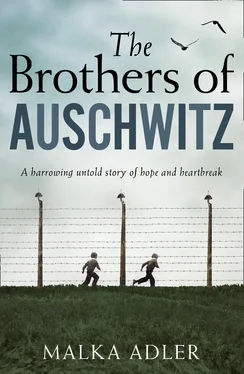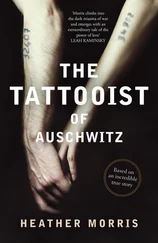They want to burn Jews. I heard it on the radio. We’ll all die, said Sarah, almost crying.
That’s exactly what Hitler planned, said Dov, putting an apple in his pocket.
Father stamped his foot, enough. Go to your room, go on, go, we have an hour to pack. Mother said, but we don’t have any suitcases or bags, how can we pack?
Father said, put everything in sheets, or even tablecloths, we’ll make bundles and tie them with rope, Avrum, run and fetch ropes from the storeroom, help the children tie the ropes, Leah, you’re in our room, I’m in the kitchen. Mother fell silent. Motionless, she folded her arms very tightly.
Sarah wept.
She said, I have to wash the dishes left from Passover night, I have to put them away in the cupboard, father shouted, never mind the dishes, they’re not important now.
Mother rose from her chair, stood at the sink, opened the tap full force, grabbed a dirty plate and quickly began to soap it. Father beat his hands against the sides of his pants, as if drawing strength, stood next to mother, turned off the tap. Mother turned round, threw the plate on the floor, drying her hands on her apron, straightened up and said, we’ll go and pack. Sarah bent down and picked the pieces off the floor, crying harder, but the plates will smell by the time we return, they’ll have to be thrown out. Dov said, don’t worry, they’ll make us all smell. Mother lifted Sarah, hugged her, brushing her hair away from her forehead, stroking her head and said, we’re going. Mother and Sarah went into the rooms. Avrum returned with rope. Followed mother. Dov stood at the window. Father collected cutlery in the kitchen.
I put on a woolen hat and went to the door. I grabbed the handle. My legs felt weak.
Father called, Icho, where are you off to?
The cowshed, I have to feed the cows, I’ll get them ready to leave.
Father was alarmed, no, no, that’s impossible, we’re going without the cows, just clothing and blankets, put your clothes in a bundle. Father stood opposite me.
I asked, what about the cows? Who will take care of the cows?
Father gave me a long hard look, said, don’t argue.
I couldn’t leave our cows. The cows lived in our yard.
The cowshed was behind the house. I enjoyed milking cows. We’d talk sometimes, as if we spoke the same language. The calves were born into my hands. I looked at Dov. The curls on his head seemed small. He looked as if he’d just had a shower.
Dov signaled me, drop it, drop it. I said to father, and who will milk our cows, the cows will die without food. Father didn’t know anything, believed the neighbors would take care of them, maybe one of the soldiers with a rifle, he wasn’t sure of anything.
I remembered my cat. I wanted to know what to do with my cat that had caught cold on Passover night. I had a large cat with black and white fur. I went back to father. He stood with his back to me, opening cupboards and he looked like a grandfather. I begged, at least the cat.
I’ll take my cat, it won’t bother us, all right?
Father spoke from inside the cupboard, leave the cat, Icho, don’t go outside. And then he straightened up, gripping his back, went over to the window opposite the road and said, come here. Look out of the window. Do you see the soldiers? They will come in soon and throw us into the street without our bundles, now do you understand?
I felt as if a sickness was spreading through my body and taking away my life. I wanted my cat. The cat that came into my bed with its purrrr purrrring. It loved having its belly tickled and a spray of milk straight from the teat on its fur. Loved licking itself, for hours. Avrum, my older brother stood in the doorway. Avrum was tall, thin and gentle like mother.
He said, come on, I’ll help you, Dov is also waiting for you. Just a minute. I wanted to hug my sick cat. Sarah stood beside me. Took me by the hand. We heard a noise outside. Sarah rushed to the window.
Her bony body leaned out and she called father: Father, father, the neighbors are in our yard, they’re calling you. Sarah was also thin. Father didn’t turn round, said, not now Sarah. Sarah called more urgently, the neighbors are coming to the door, father, go out to them. Dov came into the room, put an apple in his other pocket and then some matzos inside his shirt. He had brown eyes and muscles like a ball in each arm. He’d tossed a sweater on his back.
A knock at the door made me jump.
Father went to the door. I heard our neighbor asking, where are you off to, Strullu? It was Stanku. He always wore a peaked cap; he had a red-tipped wart on his cheek.
Father said, you tell me, maybe they said something to you.
They said nothing to me. It was you they spoke to.
Father fell silent. Stanku straightened up. And the children?
Father said, they’re leaving with us. The old people too.
Stanku took off his cap, you need bread. Father didn’t. He said, we’ve got matzos.
No, Strullu, you need bread and water for the journey. I don’t.
Take cakes, we have large cakes we made for Easter. We’ll give you the cakes. Hide them in your clothing. Who knows what will happen.
Dov said to himself, a tragedy is what will happen. A terrible tragedy.
Father smiled sadly at Stanku. He said quietly, that child is always thinking about tragedies. Don’t know what’s wrong with him. Stanku grabbed father’s hand. His hand trembled. His blue eyes were moist.
Stanku said, we’ll take care of the house, Strullu, we’ll look after the cows, and you’ll be back, you have to come back.
Father and Stanku hugged. I heard thumps on backs. I heard father say brokenly, I don’t think we’ll be back, Stanku, forgive me, I must go in. Father left.
I turned to Stanku, so you’ll look after the house, the cows too, and the cat, and you’ll feed it, yes, and if people come by and want to take it, what will you tell them?
Stanku cleared his throat. And again, holding his throat. I whispered, I have a small sum saved, I’ll give it to you, Stanku.
Stanku threw up his hands, stamped his foot on the path, said, no, no, no, and don’t worry, Icho, I’m here to take care of everything until you come safely home. We shook hands. I went inside.
Dov jumped out through the window.
I was sure Dov was escaping into the forest. I was glad he’d run away. Glad no one saw. Glad that at least one of our family would stay to take care of the house. Father, mother, Sarah, Avrum and I went to the synagogue with our bundles on our backs. Hungarian soldiers counted us. Someone snitched, said a boy from our family was missing.
Soldiers threatened father, shaking a finger at him: by nightfall. The boy must return by nightfall. Or we’ll stand all of you against the wall, boom boom boom. Understand? Father called Vassily from Dov’s class.
Vassily was Dov’s best friend. Vassily liked going without socks and hat. Winter or summer, the same. Vassily came at a run. He had a coat with one short sleeve and one long one.
Father hugged Vassily’s shoulder, saying, Vassily, bring Dov to us. He’s in the forest. Only you can do this. Vassily looked at father and was sorry, Dov, Dov. Father bent down and whispered to Vassily, tell Dov, remember Shorkodi, the young man from Budapest, he’ll understand.
Dov came back swollen from a beating.
That night he returned with Hungarian soldiers. His face stayed swollen for two days. He had a deep cut from forehead to ear. He had a crust of blood under his hair. He didn’t say a word. I was sorry, pity you came back, Dov, a pity.
Two days later, they took us by train to Ungvár, now Uzhhorod.
In the town of Ungvár they put us in a huge pit like an open mine. There were thousands of Jews there from that area without an outhouse or shower. Just a small tap and pipe. Rain kept falling. The rain washed out the mine. We were drowning in mud and a strong smell. First came the strong smell of people who were going to die. Then came the smell of human excrement. I couldn’t get used to the bad smells. I wanted to vomit even after I finished vomiting.
Читать дальше












